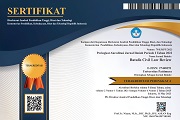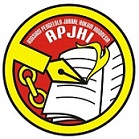Community Participation for Adaptation and Mitigation of Climate Change: Case study the implementation of Program Kampung Iklim (Proklim)
 ), Nellyana Roesa(2), Rizanna Rosemary(3)
), Nellyana Roesa(2), Rizanna Rosemary(3)
(1) Faculty of Law Syiah Kuala University, Banda Aceh, Indonesia
(2) Faculty of Law Syiah Kuala University, Banda Aceh, Indonesia
(3) Faculty of Social and Political Science Syiah Kuala University, Banda Aceh, Indonesia
 Corresponding Author
Corresponding Author
Abstract
Keywords
DOI
10.47268/ballrev.v3i2.945
Published
2022-08-26
How To Cite
@article{BALLREV945,
author = {Safrina Safrina and Nellyana Roesa and Rizanna Rosemary},
title = {Community Participation for Adaptation and Mitigation of Climate Change: Case study the implementation of Program Kampung Iklim (Proklim)},
journal = {Batulis Civil Law Review},
volume = {3},
number = {2},
year = {2022},
keywords = {Climate change; Mitigation and Adaptation; Proklim},
abstract = {Community is the most vulnerable to climate change. Engaging community is an important factor for the effectiveness and efficiency of the climate change policy and Proklim is one of solutions to implement it. Proklim is regulated through the Minister of Environment and Forestry Regulation Number P.84/MENLHK-SETJEN / KIM.1 / 11/2006 concerning the Climate Village Program and the regulation of the Director General of Climate Change Control No. P.1/PPI/SET/KUM.1/2/2017 concerning Climate Change Guideline. This study aims to analyze the forms of community participation in Proklim. The method used is a qualitative method with a juridical-empirical approach. The study found that the implementation of Proklim uses a top down approach, where the program was born not based on community initiation but came from the government, the community only acted as program beneficiaries without being actively involved. Mitigation programs are generally developed than adaptation programs. In addition, it is important to create an engaging mechanism. The existence of community groups and community leaders and the availability of supporting tools are important factors in creating the sustainability of ProKlim. This program is expected to increase public understanding of climate change and its impacts, so that lifestyle changes can adapt to it.},
issn = {2746-8151}, pages = {137--151} doi = {10.47268/ballrev.v3i2.945},
url = {https://fhukum.unpatti.ac.id/jurnal/ballrev/article/view/945}
}
Ahmed, A. U. (2006). Bangladesh Climate Change Impacts and Vulnerability: A Synthesis. In Change. Arnstein, S. R. (1969). A Ladder Of Citizen Participation. Journal of the American Planning Association, 35(4), 216–224. https://doi.org/10.1080/01944366908977225 Carter, T.R, et all. (1994). IPCC Technical Guidelines for Assessing Climate Change Impacts and Adaptations. https://www.ipcc.ch/report/ipcc-technical-guidelines-for-assessing-climate-change-impacts-and-adaptations-2/ Dakin, S. (n.d.). Challenging old models of knowledge and learning.pdf. Environments. DLHK Aceh. (n.d.). Proklim Aceh mengukir sejarah baru. Retrieved December 12, 2021, from https://dlhk.acehprov.go.id/2020/10/proklim-aceh-mengukir-sejarah-baru/ Faedlulloh, D., Prasetyanti, R., & Irawan, B. (2019). Kampung versus Climate Change: The Dynamics of Community Empowerment through the Climate Village Program (ProKlim). Journal of Physics: Conference Series, 1424(1). https://doi.org/10.1088/1742-6596/1424/1/012055 Gunawati, D., & Rejekiningsih, T. (2020). Building Ecological Citizens Through the Implementation of Climate Village Programs as Climate Change Mitigation Effort. 397(Icliqe 2019), 1124–1131. https://doi.org/10.2991/assehr.k.200129.139 IPCC. (2001). Climate Change 2001. Synthesis Report. IPCC Third Assessment Report (TAR). Ipcc, 409. http://www.ipcc.ch/ipccreports/tar/ Keeble, B. R. (1988). The Brundtland Report: “Our Common Future.” In Medicine and War (Vol. 4, Issue 1). https://doi.org/10.1080/07488008808408783 KESDM. (2016). First Nationally Determined Contribution Submitted To UNFCCC (Issue November 2016). https://www4.unfccc.int/sites/ndcstaging/PublishedDocuments/Indonesia First/First NDC Indonesia_submitted to UNFCCC Set_November 2016.pdf Muttaqin, Z., Yulianti, A., & Karmanah, K. (2019). Climate village program (ProKlim) in Simurugul Sub-Village, Margawati Village, Garut Kota Sub-Regency, Garut Regency, West Java Province, Indonesia. IOP Conference Series: Earth and Environmental Science, 299(1). https://doi.org/10.1088/1755-1315/299/1/012046 Ostrom E. (1999). Self-governance and forest resources. Self-Governance and Forest Resources, 62(20). https://doi.org/10.17528/cifor/000536 Priyanto, M. W., Mulyo, J. H., & Irham, I. (2020). Did The Program Kampung Iklim Lead Farmers to Implement more Adaptation Strategies? Case Study of Rice Farmers in Sleman Regency. Agro Ekonomi, 31(1), 1–13. https://doi.org/10.22146/ae.57396 Qomariah, A., Purnaweni, H., & Utomo, S. (2021). Community-Based Adaptation: Challenge and Opportunity in Indonesia. E3S Web of Conferences, 317, 01075. https://doi.org/10.1051/e3sconf/202131701075 Ramos-Pinto, P. (2015). Social Capital as a Capacity for Collective Action. Assessing Social Capital: Concept, Policy and Practice, 53–69. https://doi.org/10.5848/csp.0479.00004 Rosemary, R, et. a. (2022). Communicating Social Capitals of Local Communities for A Sustainable Proklim in Aceh. https://journal.univpancasila.ac.id/index.php/coverage/article/view/3170/1722 Safrina, S. (2015). Partisipasi Masyarakat dalam Pengelolaan Wilayah Pesisir di Aceh. Jurnal Hukum Lingkungan Indonesia, 2(1). https://jhli.icel.or.id/index.php/jhli/article/view/19 Salim, A. Mahdi, S, Rosemary, R. (2014). In Search of Sustainable Consensus on Environmental Dispute in Aceh. Serambi Indonesia. (2016). 62 Persen Desa di Aceh Rentan Perubahan Iklim. http://aceh.tribunnews.com/2 (news, n.d.) (Justianto, n.d.)016/05/27/62-persen-desa-di-aceh-rentan-perubahan-iklim. Smith, J. W., Anderson, D. H., & Moore, R. L. (2012). Social Capital, Place Meanings, and Perceived Resilience to Climate Change. Rural Sociology, 77(3), 380–407. https://doi.org/10.1111/j.1549-0831.2012.00082.x Sulaiman, S. (2009). Eksistensi Hukom Adat Laot Menuju Pengentasan Kemiskinan. UNFCCC. (2010). Fact sheet: The need for adaptation. October, 1–5. https://unfccc.int/files/press/backgrounders/application/pdf/press_factsh_adaptation.pdf%0Ahttp://unfccc.int/files/press/application/pdf/adaptation_fact_sheet.pdf Wibisana, A. G. (2017). Pembangungan Berkelanjutan: Status Hukum Dan Pemaknaannya. Jurnal Hukum & Pembangunan, 43(1), 54. https://doi.org/10.21143/jhp.vol43.no1.1503 Wilson, C., & Linkie, M. (2012). The panglima laot of Aceh: A case study in large-scale community-based marine management after the 2004 Indian Ocean tsunami. Oryx, 46(4), 495–500. https://doi.org/10.1017/S0030605312000191 Wiseman, J., Williamson, L., & Fritze, J. (2009). Community engagement and climate change : learning from recent Australian experience. https://doi.org/10.1108/17568691011040399
| Dublin Core | PKP Metadata Items | Metadata for this Document | |
| 1. | Title | Title of document | Community Participation for Adaptation and Mitigation of Climate Change: Case study the implementation of Program Kampung Iklim (Proklim) |
| 2. | Creator | Author's name, affiliation, country | Safrina Safrina; Faculty of Law Syiah Kuala University, Banda Aceh; Indonesia |
| 2. | Creator | Author's name, affiliation, country | Nellyana Roesa; Faculty of Law Syiah Kuala University, Banda Aceh; Indonesia |
| 2. | Creator | Author's name, affiliation, country | Rizanna Rosemary; Faculty of Social and Political Science Syiah Kuala University, Banda Aceh; Indonesia |
| 3. | Subject | Discipline(s) | |
| 3. | Subject | Keyword(s) | Climate change; Mitigation and Adaptation; Proklim |
| 4. | Description | Abstract | Community is the most vulnerable to climate change. Engaging community is an important factor for the effectiveness and efficiency of the climate change policy and Proklim is one of solutions to implement it. Proklim is regulated through the Minister of Environment and Forestry Regulation Number P.84/MENLHK-SETJEN / KIM.1 / 11/2006 concerning the Climate Village Program and the regulation of the Director General of Climate Change Control No. P.1/PPI/SET/KUM.1/2/2017 concerning Climate Change Guideline. This study aims to analyze the forms of community participation in Proklim. The method used is a qualitative method with a juridical-empirical approach. The study found that the implementation of Proklim uses a top down approach, where the program was born not based on community initiation but came from the government, the community only acted as program beneficiaries without being actively involved. Mitigation programs are generally developed than adaptation programs. In addition, it is important to create an engaging mechanism. The existence of community groups and community leaders and the availability of supporting tools are important factors in creating the sustainability of ProKlim. This program is expected to increase public understanding of climate change and its impacts, so that lifestyle changes can adapt to it. |
| 5. | Publisher | Organizing agency, location | Faculty of Law, Universitas Pattimura |
| 6. | Contributor | Sponsor(s) | |
| 7. | Date | (YYYY-MM-DD) | 2022-08-26 |
| 8. | Type | Status & genre | Peer-reviewed Article |
| 8. | Type | Type | |
| 9. | Format | File format | |
| 10. | Identifier | Uniform Resource Identifier | https://fhukum.unpatti.ac.id/jurnal/ballrev/article/view/945 |
| 10. | Identifier | Digital Object Identifier | 10.47268/ballrev.v3i2.945 |
| 11. | Source | Title; vol., no. (year) | Batulis Civil Law Review; Vol 3, No 2 (2022): VOLUME 3 NOMOR 2, NOVEMBER 2022 |
| 12. | Language | English=en | en |
| 13. | Relation | Supp. Files | |
| 14. | Coverage | Geo-spatial location, chronological period, research sample (gender, age, etc.) | |
| 15. | Rights | Copyright and permissions | Copyright: Authors who publish their manuscripts in this Journal agree to the following conditions: 1. The copyright in each article belongs to the author, as well as the right to patent. 2. Authors are able to enter into separate, additional contractual arrangements for the non-exclusive distribution of the journal's published version of the work (e.g., post it to an institutional repository or publish it in a book), with an acknowledgment of its initial publication in this journal. 3. Authors are permitted and encouraged to post their work online (e.g., in institutional repositories or on their website) prior to and during the submission process, as it can lead to productive exchanges, as well as earlier and greater citation of published work. 4. Authors have the right to self-archiving of the article (Author Self-Archiving Policy)
Licence : Batulis Civil Law Review Journal is disseminated based on the Creative Commons Attribution-NonCommercial 4.0 International license terms. This license allows anyone to copy and redistribute this material in any form or format, compose, modify, and make derivatives of this material for any purpose. You cannot use this material for commercial purposes. You must specify an appropriate name, include a link to the license, and certify that any changes have been made. You can do this in a way that is appropriate, but does not imply that the licensor supports you or your use.
|
Copyright (c) 2022 Safrina Safrina, Nellyana Roesa, Rizanna Rosemary

This work is licensed under a Creative Commons Attribution-NonCommercial 4.0 International License.

 : 3702 times
: 3702 times Download : 1930 times
Download : 1930 times














